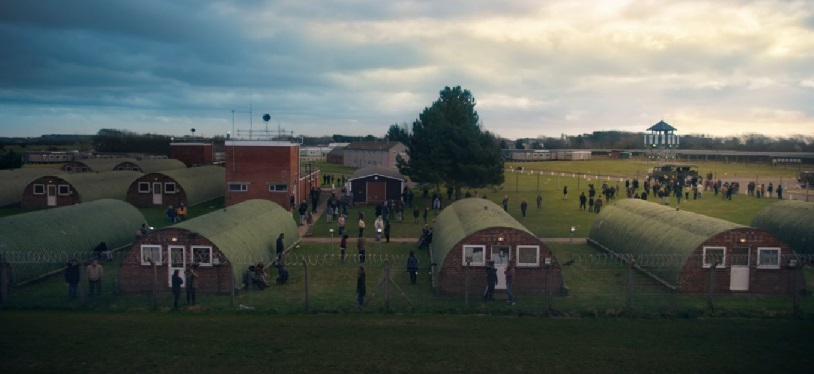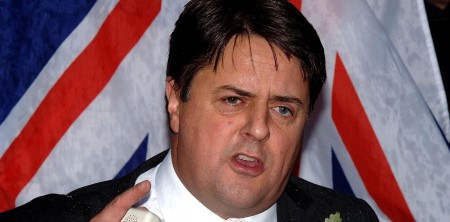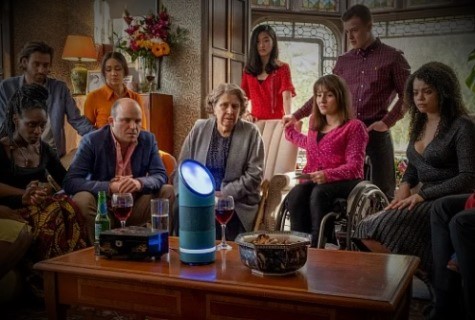
Parts I, II, and III of this article series examined the various societal and international themes derived from the prophetic fiction series Years and Years, specifically those that have become ever more pertinent due to the Russia-Ukraine War and its emergent consequences. Respectively, the themes discussed were Refugee & Housing Crises, Nuclear Attack & World War, and Financial & Employment Crises. Furthermore, this particular succession of socio-international themes was shown to comprise a logical chain reaction of crises that can be traced through the series’ narrative, implicitly when not explicitly.
Part IV presents the culmination of this chain reaction of developments in what can be thought of as their sociopolitical ‘endgame’ and the ‘comeuppance’ of accumulated follies: neo-fascism*.
*To avoid ambiguity in using this term, the Wikipedia definition will suffice here: “Neo-fascism is a post-World War II ideology that includes significant elements of fascism. Neo-fascism usually includes ultranationalism, racial supremacy, populism, authoritarianism, nativism, xenophobia and anti-immigration sentiment as well as opposition to liberal democracy, parliamentarianism, liberalism, Marxism, capitalism, communism, and socialism.”
At the time of Years and Years’ release in 2019 the growing popularity of neo-fascistic leaders in Western democratic societies was already a well-established theme, given the increasing trend towards parties and candidates that represent at least elements of neo-fascism. Indeed, with the advent and reign of ‘Trumpism’ many have argued that neo-fascism has already arrived; but more generally speaking, a neo-fascist government has thus far been averted in the democratic West.
As with the Parts I-III, the overarching theme and subthemes presented in Part IV refer back to significant predictions from the prophetic series Years and Years, specifically those that are germane to the host of problems spawned from Russia-Ukraine War and the potential implications of these developments.
Prelude
Before proceeding with the subthemes relating to the neo-fascism prophecy, a brief preface referencing Part I is first in order here, for the societal themes discussed therein are most catalytic to those of Part IV.
Part I of this article series was based on the theme of a demographic crisis due to a mass migration of refugees into Britain, as depicted in Years and Years and as has recently manifested in reality. This of course refers to the invasion of Ukraine by Russia and the resulting refugee crisis in that region; the overwhelmingly refugee-centred reaction(s) of Britain (and the international community at large); and the domestic refugee crisis presently developing as a result—which is essentially the specific scenario predicted by Years and Years as occurring between these nations.


Also discussed in Part I was the distinction between “constructive immigration” and “destructive immigration”, in order to highlight the British u-turn on immigration policy (in response to the Russia-Ukraine War) as being an idealized form of destructive immigration; then to identify the logic and early signs that spell critical repercussions from this idealistic attitude to immigration, particularly when considering the pre-existing state of British society. The sole repercussion discussed in Part I was an emergency housing crisis, first by showing how Years and Years suggested that a most literal invasion of privacy – in the form of the (as yet fictional) “Bedroom Law” – will be the sort of oppressive measures citizens will have to contend with as a result. This prediction was then related to the developing influx of Ukrainian refugees into Britain (as was predicted at the outset of Years and Years)—which is, in turn, placed in the context of the more general and long-established housing crisis in this country.
Part IV hence serves to reveal the other main repercussions of the idealized immigration policy as suggested through the Years and Years narrative. The purpose here is to compare pertinent facts with prescient projections whilst combining sound knowledge with logical thought, in order to apprehend the Russia-Ukraine War and its potential ramifications as intelligently as possible. This is particularly worthwhile during a media climate dominated by emotional moralism and idealism to the exclusion of impartial investigation and discussion, not to mention rational decision-making—thus (to put another way) attesting to the old proverb: “The first casualty of war is truth”).
Concentration Camps (…because ‘it’s beyond my [population] control’)

The theme of concentration camps (and its overarching theme of population control) is introduced in Years and Years at the end of Episode 5 and is to become a prominent feature of Episode 6—which, most notably, begins with the television news reporting that (populist) Prime Minister, Vivienne Rook, has
“…also devoted a million pounds to the fight against Monkey Flu. The epidemic continues to rage, with an estimated 1,200 dead.”
That a global pandemic emerged mere months after the series aired (i.e. during 2019) represents yet another detail in Years and Years that has fulfilled its predictive potential (and indeed intent). Of more interest here, however, is that the scene then cuts to an “Erstwhile site” where visibly sick people “step off an army truck, with other new inmates, all refugees” and are “herded along by guards (who are wearing “surgical masks”), like cattle” (quotes taken from a page of the script).
Later, the episode features a key scene of a government staff meeting where the head of the session (Jane) begins by stating
“The difficulty is. Never mind refugees. We’ve got problems with our own population. Floods, and radiation, and we predict another million homeless from coastal erosion in the next five years. We need more room! Simple as that.”
When Jane then turns to the Erstwhile sites which she refers to as “camps”, Prime Minister Rook points to the problem of using that word – that being its “negative connotations” – before explaining further that the “Erstwhile Sites are being kept off the record. In case people get upset.” Rook then delivers a frank and enlightening mini-lecture* on the historical efficiency of this method to reduce excess population, i.e. by moving the undesirables – namely refugees – into camps and “letting nature take its course”. Indeed, the Prime Minister cites the British late-19th century “invention” of concentration camps during the Boer War before she emphasizes that no one – including the officials present in the room – has heard of those Boer camps or their results—at which point she concludes: “We forget it. Because it worked”.
*Prime Minister Rook’s mini-lecture is undoubtedly the most striking if not profound instance of direct social commentary written into the show by Russell T. Davies, not to mention its remarkably direct sociohistorical insight for a BBC One fictional series; and so I have appended its full transcript to the end of this article.
Hence, rumours of ‘the disappeared’ is an important subtheme of the last episode; and our investigative protagonists – helped by Viktor, the Ukrainian refugee and sympathetic star of Years and Years – eventually discover the rumours to be horrifyingly true: that immigrants and refugees are being sent to internment camps – inside the UK – where they are left to die by confinement amongst those infected with the “raging” Monkey Flu virus—if not by starvation.

On a related note, the refugee concentration camp subplot in Years and Years immediately recalled to mind Children of Men (2006): For not only was this film remarkable in its predictive dystopic realism* but it was also set in a near-future Britain (year 2027) that practiced the ‘concentration’ of refugees into death camps. Indeed, Children of Men’s projection of tomorrow’s Britain is highly suggestive of a militarized, Nazi-esque method of order—primarily through its depictions of the concentration camps, where refugees were even shown to be executed by gunshot.
Thus, Years and Years clearly echoes the vivid and convincingly portrayed prophecy of Children of Men. However, distinctly from that that film the series depicts the causal chain of events – literally year by year from 2019 – that lead to this disturbing ironic inversion of British society: that is to say, the step-by-step transformation of Britain into its historical Nazi nemesis for which it sacrificed so much to defeat.
*Notable too that Children of Men featured a global flu pandemic—that (seems to have) also caused (i.e. aside from the mass death) the global infertility that has endangered the human species.
Could concentration camps for refugees and undesirables actually happen in Britain? Russell T. Davies – through the mouth of Years and Years’ Prime Minister Rook – explains how they can (see transcript in the appendix). Indeed, through the vehicle of the series Davies effectively illustrates the global and societal catalysts poised to bring about such a dystopian revolution, the culmination of which is embodied by the character Vivienne Rook: neo-fascism via populist government.
Populist Government (…because fascism is the new black [—again])

The last decade of the West has seen not just the emergence of populism as a legitimate political option but, more ominously, the steady rise of its influence within the realm of politics. While in America this political revolution has been represented largely by Donald Trump, Britain has been home to a variety of populist manifestations: firstly by Nick Griffin* as leader of the British National Party (BNP) from 1999-2014; next to Nigel Farage as leader of the UK Independence Party (UKIP from 2006-2009 and 2010-2016); and then to Jeremy Corbyn as leader of The Labour Party from 2015-2020—this most recent example occurring within one of the two major political parties in Britain.

*Prophetic Fiction can Shape Reality
Nick Griffin can serve usefully here to indicate the degree and frequency to which prophetic fictions not only presage reality but, indeed, even shape reality directly—and often in ways previously unimaginable (i.e. prior to the artist’s projection of it into the social consciousness).
As I recall, Nick Griffin (during his media prominence) was generally caricatured as a ‘Darth Vader’ far-right villain of Britain, whose influence in politics was hence taken more with humour and mockery than with condemnation and consternation by media commentators and the general public. However, the arrival of this populist character into the mainstream political discourse was certainly recognized as a warning sign of the potential threat populism can pose to democracy—a threat that has actually become (being the point) only more potent since the emergence of the ‘Griffinism’ so mocked.
In relation to Nick Griffin I must also mention here V for Vendetta. Adapted from a 1982 graphic novel, this 2005 film represents yet another dystopian prophecy based on a neo-fascist Britain that features both a pandemic virus and concentration camps (termed “resettlement camps” by the authorities). The point of interest here, however, is that when first watching this film I immediately recognized the character Lewis Prothero, the far-right propagandist newscaster of the fascist government and known as the “The Voice of Fate”, as being a clear parody of Nick Griffin with a striking resemblance to boot.
Furthermore, Nick Griffin was expelled from the BNP and founded his own party called the British Unity Party—and the logo he created for the party is the same symbol used by the vigilante anti-hero in V for Vendetta: a big ‘V’ with a circle around it, coloured red (on the BUP flag, the red is inverted to the background). Thus, Griffin implicitly associated his new political party with the dystopian movie – about a fascist British government – that had implicitly referenced him, thereby demonstrating the dual significance of prophetic fictions: they can be influentially prescient, i.e. like a cultural self-fulfilling prophecy.—Hence…
…both the Guy Fawkes mask and its antagonistic-anarchist signification was soon appropriated from V for Vendetta by the hacker group Anonymous, whose international presence and sociopolitical influence have been publicized ever since.


BNP leader Nick Griffin and his parodic fictional incarnation Lewis Prothero, as alluded to in the movie version of V for Vendetta.

Years and Years extrapolates this trend (that is, the growing popularity of populism) by illustrating how and why a populist leader can become Prime Minister of Britain; and more significantly it reveals the false promise of populist leadership suggesting that it is, in fact, more likely to produce even more oppression than the traditional politics it had appeared to transcend.
Throughout the series the political candidate Vivienne Rook is shown to be gaining popularity by the astonishing but refreshing frankness of her rhetoric, as she staunchly appeals to the needs of average Britain citizens in (apparent) opposition to the agendas of politicians and capitalists.
A key scene of Vivienne Rook is on the political debate show Question Time, during which an audience member asks her
“What would you say to a Palestinian family on the Gaza Strip, when Israel has reduced the electricity supply to two hours a day! Two hours!”
Rook’s response – described in the script as “Her first step towards power” – is
“I know. But I suppose… When it comes to Israel. And Palestine… (deep breath) I don’t give a fuck.”
This astonishing statement on a live television broadcast of major debate programme, as well as the unapologetic attitude with which she responds to the ensuing censure, creates a media sensation out of Vivienne Rook. She then of course capitalizes on this infamy to gain yet more media exposure – not to mention popularity – which, years later, she invests into her political campaign for Prime Minister: the Four Star Party, which she inaugurates by explaining that it is named
“In honour of my little faux pas all those years ago on live TV. And the censorship I have faced ever since, in the fake news media. But we’re four stars, striving to be five, that’s what we represent. Ambition. The ambition of the ordinary man and woman. The people abandoned by the parties of old. The Tories are dead. Labour is dead. The Liberal Democrats are dead. And the Four Star Party is bursting with life!”
The combination of extreme social disaffection (due to ceaseless crises and declines in living standards) and Rook’s uncompromising expression of most people’s sentiments eventually leads to her winning the general election. Following this the series is quick to indicate the neo-fascist elements of the new populist government, such as the privatization of the police force. However, Rook’s neo-fascism is emphasized by her authoritarian method for dealing with the housing crisis: the oppressive ‘Bedroom Law’; and even more unconscionably by her covert methods of dealing with the refugee crises: ‘Erstwhile’ concentration camps, to which the rumoured “Disappeared” people have indeed been ‘concentrated’—meaning, sent to die.
In amongst these signs of Britain’s decent into neo-fascism is another dystopian theme not unrelated to that of concentration camps and privatized policing: zoning.
Zoning (…because ‘freedom [of movement] is slavery’)
Under the populist Rook government, areas in Britain deemed to be ‘high crime’ are designated as “Red Zones”, the rules for which effectively amount to the inverse of a ‘gated community’: the forced fencing-off of neighbourhoods for the purpose of keeping the residents in (i.e. as opposed to the voluntary segregation of one’s community for the purpose of keeping non-residents out). Thus estates are designated “Criminal Zones” manned by private security guards—which is what happens in Rosie’s estate: a police constable approaches her food truck informing her that her licence to trade is no longer applicable in that area, for it is now a Red Zone. When Rosie discovers that she cannot obtain a licence to trade there – despite that this is her business and source of income – she realizes that
“They’re not fencing us off to stop criminals. They’re making us the criminals, they’re locking us in!”
At the other end of the zoning spectrum, privileged boroughs are protected from outsiders entering by policy of ‘means-testing’, meaning that no non-resident can enter that borough (Kensington being the example given) without undergoing and passing a test that confirms the suitable ‘standard’ of their financial and social ‘means’.
Population Displacement (…because fleeing feels freeing)
Related to zoning is a theme that somewhat inverts that of ‘unfreedom of movement’: population displacement, which features briefly via a news report of ‘dirty bombs’ being set off in Leeds. It is notable that the news report quite obviously sensationalizes the event by adopting a ‘war zone’ style of reporting, complete with civilians providing hysterical soundbites that signify nothing more than fear of death and desperation to flee. An “enthusiastic expert” (as described in the script) explains that dirty bombs are designed to contaminate large areas by spreading radioactive material, thus providing the pretext for the “Bedroom Law” decree that immediately follows. Hence Leeds (and other cities in which ‘dirty bombs’ have been set off, such as Bristol) must be evacuated, the effect of which is to exacerbate the pre-existent housing crisis into a national emergency; whilst ‘flooding’ was also cited as necessitating the Bedroom Law. Thus, Years and Years suggests that various events will give the government cause to mandate the movement of people out of their homes and into another region—and in this case, into the homes of other people.
***
The essential message delivered by Years and Years on the theme of populism is that societal collapse (due largely to impotent or destructive leadership) breeds the political conditions that give rise to populism; that the rule of populist government leads to a further decline in democratic principles, in the form of neo-fascism or the like; and that socio-global trends pre-existing the series make such an outcome inevitable. The series also embeds repeated indications that the democratic West is backsliding into neo-fascism (Spain being the most prominently alluded) when not into dictatorship (the US is suggested as having become such). However, Years and Years strongly suggests that Britain is the place in which the most radical and dystopian changes will occur—that is, over and above the fact that the series is set in Britain, which thereby serves to represent the dystopian trends that are actually occurring across the world.
Relating to the theme of neo-fascism rising in Britain and the West is one that significantly augments it, alluding to an overarching and more insidious global trend; a theme that has gained much political and cultural currency in recent years: deep state.
Deep State (…because ‘it does not exist’ [—or you won’t])

The government staff meeting during which Vivienne Rook shares her ‘final solution’-esque methodology concerning the refugee and housing crises is preceded by a short conversation with Stephen Lyons who – having degraded himself to reacquire a top job – has met her unexpectedly, alone in a side room. The key part of the scene is the following exchange, which speaks for itself:
Vivienne Rook: If I could do it. I’d go. I’d sail away. Far from all this. Just head for the horizon, and… gone. Imagine if I did.
Stephen Lyons: Well. You’re the Prime Minister. You can do what you want.
And for a moment, it sweeps over her. She is terrified.
Vivienne Rook: They’d kill me.
Stephen Lyons: Who would?
Vivienne Rook: They would have me killed.
Then it passes. She gathers herself. She gives him a nod. And then she goes.
The radical Prime Minister who rose to power by populist demand is thus implied to be mere a cog in the wheel of far-reaching yet invisible machine—a.k.a. the deep state. That the notion and term ‘deep state’ has risen into public discourse is no doubt a reflection of politics having ‘progressively’ descended into a flagrantly ridiculous spectacle, in which politicians are either impotent, incompetent, uncouth, buffoonish, outlandish, incoherent, hypocrites, hysterics, egomaniacs, liars, lap dogs, senile… and generally combinations thereof. It thus stands to reason that ‘deep state’ or no, ‘politics’ – as in its traditional Western role – is all but obsolete in the world of today; and indeed the ‘statesman’ of old has long been extinct. Hence it is unsurprising that the average citizen no longer bothers to vote, for the sociopolitical sphere has for generations now engendered an underlying attitude of futility—a sentiment personified (and harnessed) by outlandish populist leaders such as Rook:
‘I suppose… When it comes to politics… (deep breath) I don’t give a ****.’
***
Signor, which predictions from Years and Years have I not mentioned on this site?
Years and Years: science-fiction drama series, six episodes, original release 14 May – 18 June 2019, Britain. Predictions from Years and Years not mentioned on Stepping Stones website are holographic face filters, pornography school lessons, extinction of insects, phone skinplants, blink technology jammer, delivery drones, synthetic alcohol, mandatory IQ-tested voting, medicinal shortage, illicit off-coast surgery, same-sex marriage repeal, deep-fake political campaigns, eyeborg implants, digital consciousness, endangered cocoa bean, artificial meat, BBC closure, fallen Tower of Pisa, Signor virtual assistant.—Would you like to know more?

Appendix
Prime Minister Rook’s ‘Concentration Camp’ Lecture
From the Episode 5 script of Years and Years:
Vivienne Rook: The Erstwhile Sites are being kept off the record. In case people get upset. Although, personally, I think the public are more stoic than that. As Victoria Wood once said, the British would only have a revolution if they changed the laws on caravanning.
Laughter! Too much laughter, all round the room.
But let’s look at the words. Let’s stare them down. The word concentration simply means a concentration of anything. If you filled a camp with oranges, it would be a concentration camp, by dint of the oranges being concentrated, simple as that. I’ve made it sound rather tasty. And the notion of a concentration camp goes way back. To the nineteenth century. The Boer War. They were British inventions, built in South Africa to house the men, women and children made homeless by the conflict. Refugees! You see? Everything is older than we think. And everything old, happens again. […] If you consider these Erstwhile Sites. And how to make them work. They will never stop filling up, never, absolutely never, these problems will never go away, believe me, I can see the vast migration of people stretching ahead for centuries. So what if we look back? Through history. Because the British found a way to empty those camps in South Africa. All those years ago. They simply let nature take its course. The camps were crowded, and pestilent, and noxious, they were rife with disease, which was, on the one hand, regrettable, and on the other hand, fitting. Because a natural selection process took place, and the population of the camps controlled itself. You might call it neglect. Or you might call it efficient. And it was Kitchener who did this. Kitchener! Your Country Needs You. And, let’s say another word, some people called this policy genocide. But have you ever heard of it? The camps, the Boers, the result?
Silence.
Have You?
All mutter, shake heads, no.
Have you read about it? Were you taught it? Do we remember it?
All stronger, no, no.
We forget it. Because it worked. (stands, leaving) I’ve said enough. Thank you.


